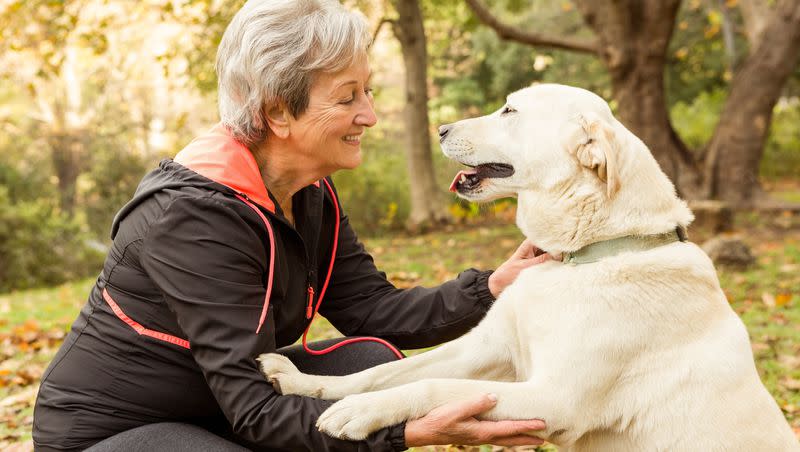Living with a pet could slow cognitive decline in older adults

Having a pet could slow cognitive decline in older adults who live alone, according to a new study. The researchers said that pet ownership “completely offset the associations between living alone and declining rates in verbal memory, verbal fluency and composite verbal cognition.”
A study involving 7,984 people 50 and older (average age 66) found pet ownership was associated with slower rates of decline in those verbal areas among those who live alone, though it didn’t make a difference for those who live with other people. Participants were part of the English Longitudinal Study of Ageing in the United Kingdom. The findings from researchers at Sun Yat-sen University in Guangzhou, China, were published in JAMA Network Open.
The researchers note that they only looked at verbal cognitive function, not other aspects of cognition, which include episodic memory, executive function, attention, reasoning, processing speed and accuracy, among other things. They said that “a comprehensive cognitive function assessment is needed to explore the association between pet ownership and global cognitive decline.”
They only asked about pet ownership once over the nine years they examined health data, they said, which could mean something they weren’t looking at might account for the findings, they said.
WebMD notes that cognitive decline occurs naturally as people age and includes problems with memory and thinking. “An estimated 10% to 20% of people over age 65 may have a more advanced form of decline called mild cognitive impairment, which can be a precursor to dementia.”
Per CNN, “Living alone has been linked to increased anxiety and depression, especially if it follows the death of or divorce or separation from a partner, according to studies. A 2022 study found living alone, compared to living with others, increased the risk of depression by 42%. Depression, in turn, can double the risk of developing dementia, scientists have discovered; a 2020 commission named late-life depression as one of 12 major risk factors for dementia.”
Related
Dr. Thomas Wisnieski, director of NYU Langone Health’s Division of Cognitive Neurology, told USA Today that the study builds on existing evidence that preventing isolation, loneliness and stress can reduce the risk of Alzheimer’s disease and other forms of dementia.
“Research indicates that having long-term, high-quality relationships, whether that’s with family, friends, or romantic relationships, is not only important for happiness but for promoting good brain health and reducing the risk for dementia,” Dr. Leah Croll, assistant professor of neurology at the Lewis Katz School of Medicine at Temple University, told ABC News.
She said pet ownership might provide an “alternative option for people whose social circumstances don’t allow for them to have frequent interactions with other people.”
While the research is the first to look at pet ownership’s impact on cognition and compare those who live with others and those who live alone, it’s not the first study to suggest that pet ownership is good for cognition among older adults. In February 2022, the American Academy of Neurology issued a news release on findings from a study it featured at its annual meeting.
“Owning a pet, like a dog or cat, especially for five years or longer, may be linked to slower cognitive decline in older adults, according to a preliminary study,” it said. That research, from the University of Michigan Medical Center and University of Florida, used data from the Health and Retirement Study, a nationally representative look at U.S. adults 50 and older who had normal cognition when the study started, and concluded that long-term pet ownership could mitigate cognitive decline in older adults.

